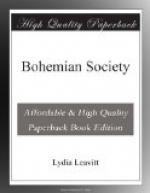What can be more pitiful than the apathy and utter uselessness of the would-be fine lady who is ennuied to the last degree; one perhaps with good ability who is conscious of the fact that she is capable of something better, would like to turn her attention to something useful, but is restrained from doing so by the fear of what “society” will say. Any society which is worth knowing will extend the right hand of fellowship to the self-reliant noble woman, much more readily than to the useless nonentity. Life to be pleasant must have an aim, an object, and every one has been given some talent to make use of and for such he or she must answer at “the last great day.”
Life can not but be pleasant to those who make nature a study. There is a vast book open before us and every one who chooses can open a page. The study will never grow monotonous, for nature is constantly changing and with lavish hand showers upon her children from her great store house innumerable blessings, to those who “see books in running brooks, sermons in stones and good in everything.”
From the fern by the way side to the study of psychology—the most fascinating of all studies—there is something in which all can interest themselves, but more especially for women, for to me this seems woman’s kingdom. With much quicker perceptive faculties than men, they are better able to see the finer more delicate portion of nature’s handiwork and mysteries. Unfortunately in small towns if a woman tries to investigate spiritualism, she is immediately called a spiritualist. If she takes an interest in mesmerism and psychology, she is called visionary. If she takes an interest in the religious discussion of the day, she is called an atheist. If she takes an interest in pathology she is called strong minded, and who does not abhor the so-called strong minded woman. A woman may be essentially womanly and take an interest in all these things. Brain was given to woman for reason and investigation, and “I rather choose to endure the wounds of those darts which envy casteth at novelty, than to go on safely and sleepily in the easy ways of ancient mistakings.” Life cannot but be pleasant to those who are fond of books, “our silent companions.” They speak a language all their own and we can find companionship for every mood, grave, gay, dreamy, discursive, philosophical and scientific.
If you are a busy worker in a large city and wish a breath of country air, a breeze from the meadow, a ramble along a country road, read Whittier’s “Among the Hills.”
“Pleasant it was
when woods were green
And winds
were soft and low,
To lie amid some sylvan
scene
Where shadows dark—and
sunlight sheen,
Alternate
come and go.”
If you are weary with brain work and seek repose, read Longfellow.
“And the cares
that infest the day,
Shall fold their tents
like the Arabs,
And as silently steal
away.”




